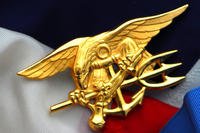CHARLESTON, W.Va. – National Guard soldiers and airmen are collecting water samples for testing to help West Virginia officials after a chemical spill left more than 300,000 residents without drinking water.
Weapons of mass destruction civil support teams from five states have been working in the Charleston area since Jan. 9 to assist the West Virginia National Guard's 35th Civil Support Team with the collection, data entry and transport of water samples for evaluation.
"The impact of the National Guard has been huge," said Jeff McIntyre, president of West Virginia American Water. His company has a lot of capability and technically savvy people, he added, but the Guard has played a key role in helping with a water sampling effort that spans more than 3,000 square miles.
"Their support shows us how important the National Guard is to a state and community, or even a private enterprise that can't do everything it needs for the people of West Virginia," he said.
West Virginia officials lifted water restrictions that began Jan. 9, but sampling continues to evaluate the water supply. Officials said they will continue testing until the system has been sampled and tested at 10 parts per billion, a level well below the Centers for Disease Control and Prevention’s recommended threshold for public health and considered to be the level of nondetection.
Guard teams from Tennessee, Ohio and Washington, D.C., deployed for duty soon after the initial spill to assist the 35th CST with water sample collection, inputting tracking information and transporting samples to testing labs for evaluation. Teams from Virginia and Pennsylvania arrived Jan. 18 to continue support after the initial teams departed.
"After our initial response, we realized pretty quickly that we were going to need some help," said Army Lt. Col. Greg Grant, 35th CST commander. He said that while the water company personnel were skilled and experienced in their operations, the demand of collecting more than 1,500 samples over more than 10 days required a huge effort. With the help of the other National Guard civil support teams, water sampling operations have been running 24 hours a day.
Guard soldiers and airmen pair up with West Virginia American Water employees. They travel to a designated survey point, collect a water sample, label it, then return it to a collection point, where the key data is captured and the sample is sent off for evaluation. Civil support teams continue to track the samples until the evaluation results are returned from the lab.
"Our baseline survey task is to go to a point, take a sample, bring it back and get it to an analytical lab," said Army Maj. Casey Cox, commander of the 34th CST. He said the nuts and bolts behind effective sampling is the data and being able to carefully and accurately track the sample results through the entire process.
The coordinated, multistate response also has validated many of the training practices and procedures used by the civil support teams, officials said. Grant explained that because the teams are regionally aligned and often train together, relationships that already had been established improved the initial response’s effectiveness. Because the teams follow standard protocols and procedures, he added, it was easy to integrate new members into the operation without compromising mission effectiveness.
National Guard Bureau officials said the Guard’s 57 weapons of mass destruction civil support teams are located in each state, U.S. territory and Washington D.C., with two each in California, Florida and New York. The teams are on standby 24 hours a day, seven days a week, and can deploy an advance team within 90 minutes of notification. The main body deploys within three hours.
Grant said he called the commander of the Tennessee civil support team at 10:30 a.m., and the team was on a plane at 3:30 p.m. "The professionalism and skill sets of the National Guard and CSTs are really remarkable, and we know we can count on each other," he said.
Cox said he’s pleased with how quickly his team was able to alert, marshal and deploy safely into West Virginia. Their experience in West Virginia is allowing them to exercise their sampling skills and will make them more effective, he added. "What we are doing here is allowing us to hone our skills for future missions," he said.
A National Guard weapons of mass destruction civil support team is composed of 22 full-time Army and Air National Guard personnel with the mission to support civil authorities at a domestic chemical, biological, radiological and nuclear incident site with identification and assessment of hazards, advice to civil authorities, and facilitating the arrival of follow-on military forces during emergencies and incidents of weapons of mass destruction terrorism.
Following Hurricane Katrina, the mission expanded to include natural and manmade disasters. Officials said the units complement and enhance, but do not duplicate, state response capabilities.
More than 500 members of the West Virginia National Guard have been on duty assisting with water testing as well as distribution of bottled water to residents in support of the state's multiagency response to the situation.

























